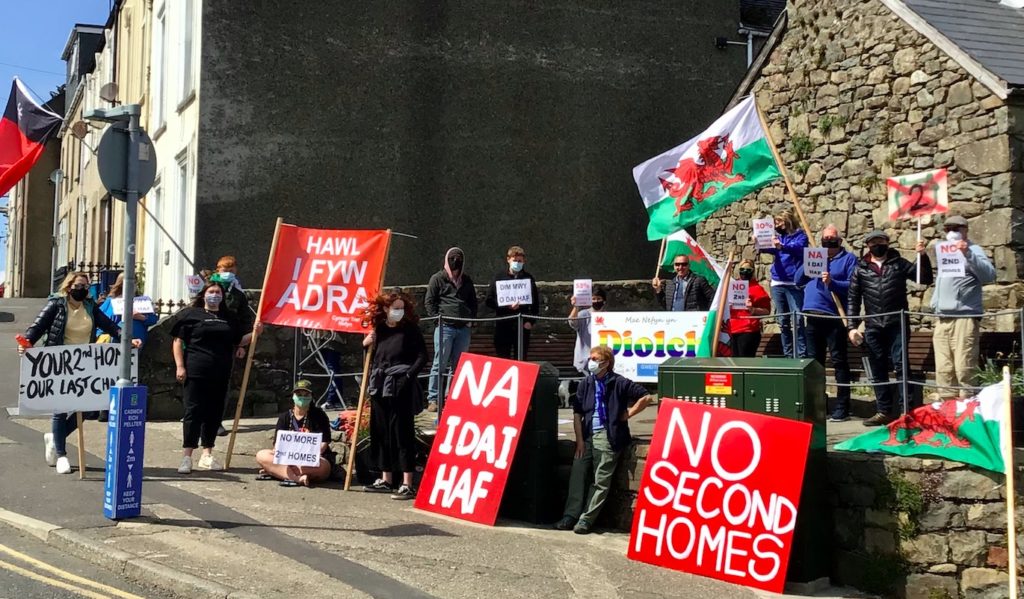Why co-operative housing may be a solution to the second homes crisis

Jocelle Lovell and Daniel Roberts
There is a second homes crisis in Welsh communities.
New figures from the Welsh Revenue Authority show 44% of all homes sold in the Gwynedd constituency of Dwyfor Meirionnydd during 2020-21 were second homes or buy-to-let properties.
These communities are heavily impacted by this trend in a number of ways; from putting the survival of Cymraeg as a community language at risk, to making it harder for local people to get on the housing ladder, and threatening the survival of vibrant places as genuine communities. It is clear this is something that needs a policy and community response.
At the Wales Co-operative Centre, our Communities Creating Homes project offers support and advice to new and existing organisations looking to develop co-operative and community-led housing schemes in Wales.
Funded by the Welsh Government and the Nationwide Foundation, this project has already had a significant impact. The programme is currently working with 50 groups and organisations at various stages to develop community-led housing projects, showing the considerable demand for this model of housing that already exists.
We strongly believe that the community-led and co-operative models have significant potential to contribute to tackling the housing crisis across Wales, but particularly so in the context of the challenges facing our rural and coastal communities.
Community-led
Community-led housing schemes can come in a variety of forms, but fundamentally it means when a community takes a leading role in providing housing solutions – whether that’s through building a new property, taking over existing properties, or protecting existing affordable housing stock. There are a number of benefits to this model, for the residents, providers and communities as a whole.
Research has found that living in community-led accommodation can lead to improved skills and confidence, better physical and mental health, and greater community cohesion.
Community-led housing is often delivered in partnership with housing associations and local authorities. For these housing providers, this model provides greater ease of letting of properties, reduced incidences of rent arrears, complaints and antisocial behaviour, as well as higher levels of resident engagement.
It is clear to see the benefits that this model can have for the wider community. In the context of the second homes crisis, facilitating local people to take greater control of their housing stock will lead to more active, cohesive and resilient communities.
One of our key asks of Welsh political parties before the Senedd election this year was to make specific reference in their manifestos to the potential of community-led and co-operative housing, so we were excited to see that this was part of the new Welsh Government’s Programme for Government.
We are looking forward to continuing to work hard to promote this model and support communities across Wales to build a community-led housing movement, and are convinced about its potential in the communities most affected by the surge in second home ownership. This model puts communities and co-operation at the heart of decision-making, not private profit.
The Communities Creating Homes team has significant experience of working with community-led housing projects across Wales, and we want to use our insights to ensure the most effective policy possible is being developed to support communities to take more control in the housing market.
Barriers
Two of the main barriers to the development of this housing model in Wales that we have identified are access to land or property, and access to appropriate finance. These are areas where we believe Government should intervene, to facilitate the community ultimately taking a custodian role over land and other assets in their community.
We have called for financial transactions capital to be used to launch a revolving loan fund, to allow for projects to progress their scheme.
Our models suggest that this fund would break even within ten to fifteen years, and have a considerable impact on how our communities can take control of the housing agenda.
In addition, we know that the question of the community’s rights to take over land and other local assets is more important than ever in Wales. We believe there is much to be learned from the Scottish Land Reform Act and Scottish Land Fund – to empower communities to take ownership of their local communities.
There is no doubt that there needs to be a multi-faceted approach to tackling this complex issue, to ensure that young people in rural and coastal Wales are able to live in their home towns, that these places survive as living communities, and that the Welsh language continues to thrive as a community language.
The challenges facing coastal, rural and Welsh-speaking communities are complex, but we strongly believe that a community-led approach is essential. As the housing crisis becomes more and more stark, this should be at the forefront of community action, and the Government has a key role in facilitating this.
We want the Welsh Government to include community-led housing options in the proposed Welsh Language Communities Housing Plan, and the Wales Co-operative Centre and the Communities Creating Homes team is looking forward to playing a key role in the Welsh Government’s commitment to supporting the expansion of this model in Wales.
On the 16th of September, the Wales Community-led Housing Network is meeting virtually to discuss how community-led housing can provide a solution to this issue: https://www.eventbrite.co.uk/e/wales-community-led-housing-network-tickets-131022416575.
Jocelle Lovell is Director of Inclusive Communities at the Wales Co-operative Centre, and Daniel Roberts is Policy and Research Officer
Support our Nation today
For the price of a cup of coffee a month you can help us create an independent, not-for-profit, national news service for the people of Wales, by the people of Wales.






There is talk on the streets that this situation could lead to the revival of the Mebion Glyndwr second home burning campaign which was shockingly effective.